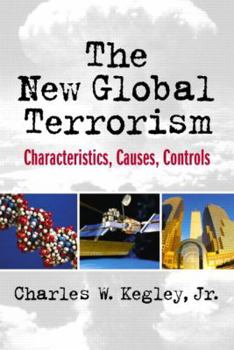The New Global Terrorism: Characteristics, Causes, Controls
Select Format
Select Condition 
Book Overview
This book comprehensively covers the debatable issues regarding the post-September 11th wave of terrorism, the multiple roots of this deadly new form of international violence, and the leading ideas... This description may be from another edition of this product.
Format:Paperback
Language:English
ISBN:0130494135
ISBN13:9780130494139
Release Date:October 2002
Publisher:Pearson
Length:304 Pages
Weight:0.85 lbs.
Dimensions:0.6" x 6.1" x 9.1"
Customer Reviews
1 rating
Best Terrorism Book
Published by Thriftbooks.com User , 18 years ago
I rarely give five stars to anything, but this is quite possibly the best terrorism book ever, at least in terms of the sample of readings. Twenty-one chapters in all, the contributors all being well-known scholars in the political science field mainly. The textbook is very scholarly, divided into three parts, corresponding to the purposes of science: description, explanation, and prescription. Each part is excellent, and the book is well-balanced. Part I (description/characteristics)is a little heavy on the theoretical side, especially where there is some repetitive use of the phrase "post-modern" and exploration of historical side roads, but doesn't devolve into a bunch of navel-gazing over definitions and typologies like so many other books do. One could actually "use" the stuff in Part I, either for further theory development or other grounded purposes. Part II (explanation/causes) is probably what most readers would turn to first. It's nothing more than a collection of writings by all the luminaries in the field: Crenshaw, Wilkinson, Rubenstein, Laqueur, Howell, Juergensmeyer, Lewis, and Gurr. One couldn't ask for a better lineup, and although some of the articles have been previously published, a lot of them look like they were updated and revised for this book. Selection bias is always a possibility with books of this kind, and to be sure, the book is overall critical of mindless understanding approaches to counterterrorism, but not overly concessionistic. Military solutions are discussed, and lesser-known authors like Howell write about darwinistic solutions like letting failed states collapse on their own. However, Part III has counterweighting articles like Falk and Johnson's excellent discussions of why the war on terrorism is a moral war against "evil" (in the non-metaphysical sense). The third part of the book isn't about strategy or grand strategy, as one might expect, but is about tactics and counter-tactics, representing, in short, as good of a primer as any, on the political science approaches to counterterrorism option selection. I highly recommend this little book be read by anyone who wants to quickly become an erudite scholar of terrorism. It's highly educative.





